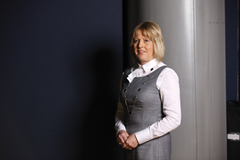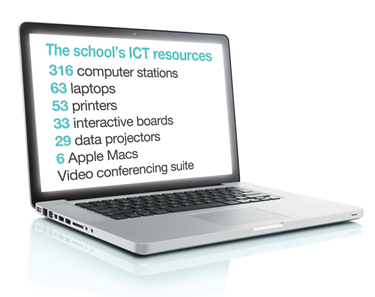A class act: St Pius X College
 St Pius X College in Magherafelt has been praised for its award-winning ICT initiatives. Emma Blee finds out how these have helped improve learning from principal Mary White.
St Pius X College in Magherafelt has been praised for its award-winning ICT initiatives. Emma Blee finds out how these have helped improve learning from principal Mary White.
Video conferencing and up-to-date technology “has to be the future” for teaching, says St Pius X principal Mary White.
The college, which has 908 pupils and 65 teaching staff, was commended for its “infectious enthusiasm” by judges who presented it with the Becta ICT Excellence Award 2010.
Following a refurbishment in 2000, the school has honed in on the opportunity to develop modern IT facilities, including computer suites and a video conferencing room.
A forward-thinking principal, White says ICT should be an integral part of all teaching and learning. Her staff run lunch and after-school computer clubs, as well as encouraging pupils to forge links with local businesses. Parents have also become more involved with the college by logging onto the website and through programmes such as Truancy Call, where they are notified by SMS if their child doesn’t turn up for class.
The college is part of the Magherafelt Learning Partnership (MLP), which comprises four other post-primary schools in the area, the Northern Regional College and a local special school. White believes that ICT initiatives are continually providing new opportunities to work more efficiently.
“Through the MLP, the two main areas we will be focusing on are video conferencing and home school access. Video conferencing will help to cut down on travel so it should save time and money.
“Instead of sending two students from St Mary’s in Magherafelt to learn A-level chemistry, we would have a video link between the two schools so our students could stay at the school and study without having to travel.”
The school has used video conferencing to link up with pupils at Ciraggo Middle School in Texas and could also be used if a child is off school sick. “It has to be the way of the future,” highlights White.
While all pupils are skilled ICT users, she noticed that many parents and grandparents were lacking in computer skills and has organised a series of inter- generational evening classes.
“The parents who don’t know how to use computers come in along with students. We tried grannies and students and we tried parents and students, and the two groups were working together. It has definitely helped them to understand ICT better,” she explains.
Being crowned winners of the award has helped raise the reputation of the school: “Children still want to come to the school and we’re still meeting our intake,” comments White. “It is recognition of the work that we are doing within the school, of all the teachers and pupils and that was the main thing.”
It has also been a good way to re-think how the college works: “Applying for the award and going through the self-review framework was a very good self- evaluation of what we are doing in ICT. It’s very difficult to always keep to the floor in ICT so the process makes you look at yourself, where you are and where you want to go.”
The ICT initiatives have also helped to boost grades. Last year, 99 per cent of GCSE students taking CCEA exams were awarded A*-C grades. However, achieving academic success was not the school’s only goal. White’s aim was to use ICT to ensure “real value-added is provided to improve teaching and raise standards”.
 “It’s the relationships within the school that the parents comment on. That’s why they send their children to our school, because they know that they will achieve there,” she comments.
“It’s the relationships within the school that the parents comment on. That’s why they send their children to our school, because they know that they will achieve there,” she comments.
E-learning co-ordinator Gerard Duffy develops the school website and online initiatives. He says that allowing pupils to choose their own style of learning with ICT and the “careful embedding of technology” in the curriculum means each student receives a “highly personalised experience”.
Duffy believes that staff training is a major part of the school’s success with ICT: “Regular inset training on the latest technologies ensure teaching and non- teaching staff are equipped with the high- level ICT skills to support 21st century learners.”
However, by increasing the use of ICT applications in school, staff have had to come up with a stringent e-safety policy. White says the policy, which is updated annually, is “essential” for a secure and safe learning environment and to avoid problems.
She comments: “It is a contract for all staff and students and it is promoted through the school’s website, homework diaries, information evenings and class lessons.”





